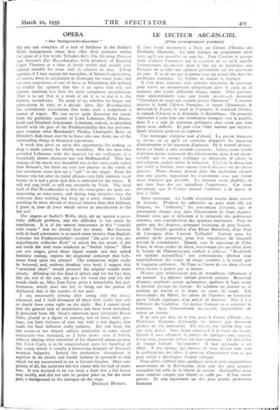OPERA
"Der Dreigroschenkavalier "
No one can complain of a lack of boldness in the Sadler's Wells management when they offer their audience within the space of a few weeks Tchaikovsky's The Sleeping Princess and Strauss's Der Rosenkavalier, both products of Imperial Court Theatres at a time of lavish wealth and usually con- sidered suitable for issue only in editions de luxe. Cheap reprints, if I may sustain the metaphor, of Strauss's opera have, of course, been in circulation in Germany for many years, but my own experience of one of these at Nuremberg did nothing to modify the opinion that this is an opera that will not tolerate anything less than the most sumptuous presentation. That is to say that as a work of art it is, to put it at the highest, second-rate. To many of us, whether we began our opera-going in 1913 or a decade later, Der Rosenkavalier has sentimental associations that make such a judgement a matter of regret. We can never quite dissociate the music from the particular accents of Lotte Lehmann, Delia Rhein- hardt and Elisabeth Schumann. Lelunann, indeed, so identified herself with the part of the Felcimarschallin that her perform- ance remains what Bemhardt's Phedre, Chaliapin's Boris or Destinn's Aida must ever be to those who saw them, one of the outstanding things in theatrical experience.
A work that gives an artist this opportunity for making so deep a mark cannot be wholly worthless. But the man who provided Lehmann with the material for the realisation of a beautifully drawn character was von Hoffmansthal. That her singing of the music was beautiful was to her own credit rather than Strauss's, for there are very few phrases in the whole of this enormous score that are a " gift " to the singer. Even the famous trio has after its initial phrases very little intrinsic vocal beauty in it and a great deal that is awkward for the voices. It will not sing itself, as will any ensemble by Verdi. The chief fault of Der Rosenkavalier is that the voice-parts are quite un- interesting as voice-parts, and during long stretches even the orchestra does nothing but keep up a noisy chatter. Could anything be more devoid of musical interest than that brilliant, I grant it, tour de force which serves as introduction to the last act?
The singers at Sadler's Wells, then, are up against a pecu- liarly difficult problem, and the difficulty is not cased by translation. It is of the utmost importance in this "comedy with music" that we should hear the words. But German with its hard consonants is so much more incisive than English. Consider the Feldmarschallin's scornful "Da geht er hin, der aufgeblasene schlechte Ken," of which the last words (I did not catch the rest) were rendered as "foolish fellow." How can any singer, given those liquid sounds and that added feminine ending, express the disgusted contempt that Leh- mann fixed upon the phrase? The translation might easily be bettered, and, without thinking very hard, I suggest that "wretched churl" would preserve the original sounds more closely. Allowing for this kind of defect, and for the fact that, like the rest of the cast, she goes for vocal line and lets the words elude us, Miss Joan Cross gives a remarkably fine per- formance, which does not fail to bring out the pathos of disillusion that is the essence of her part.
I am necessarily writing after seeing only the dress- rehearsal, and I shall disregard all those little faults that will no doubt have come right on the night. But I cannot think that the general lack of incisiveness can have been remedied. It detracted from Mr. Stear's otherwise most admirable Baron Ochs, played as a figure of comedy, not of farce, with, per- haps, too little richness of tone but with a real dignity that made his final deflation really pathetic. ,His exit from the last scene—a too elegant cabinet particulier in some smart restaurant—was managed, as I have never seen it before, without abating what remained of his shattered amour-propre. Mr. Clive Carey is to be congratulated upon his handling of this scene, which is usually a distressing example of Strauss's essential vulgarity. Indeed the production throughout is superior in its details and hardly inferior in spectacle to that which we are accustomed to see at Covent Garden. Must sur- prising of all, the orchestra did not sound thin for lack of num- bers. It was inclined to be too loud, a fault that a full house may rectify, and did not take its proper place as, for the most part, a background to the dialogue on the stage.
DYNELEY HUSSEY.










































 Previous page
Previous page